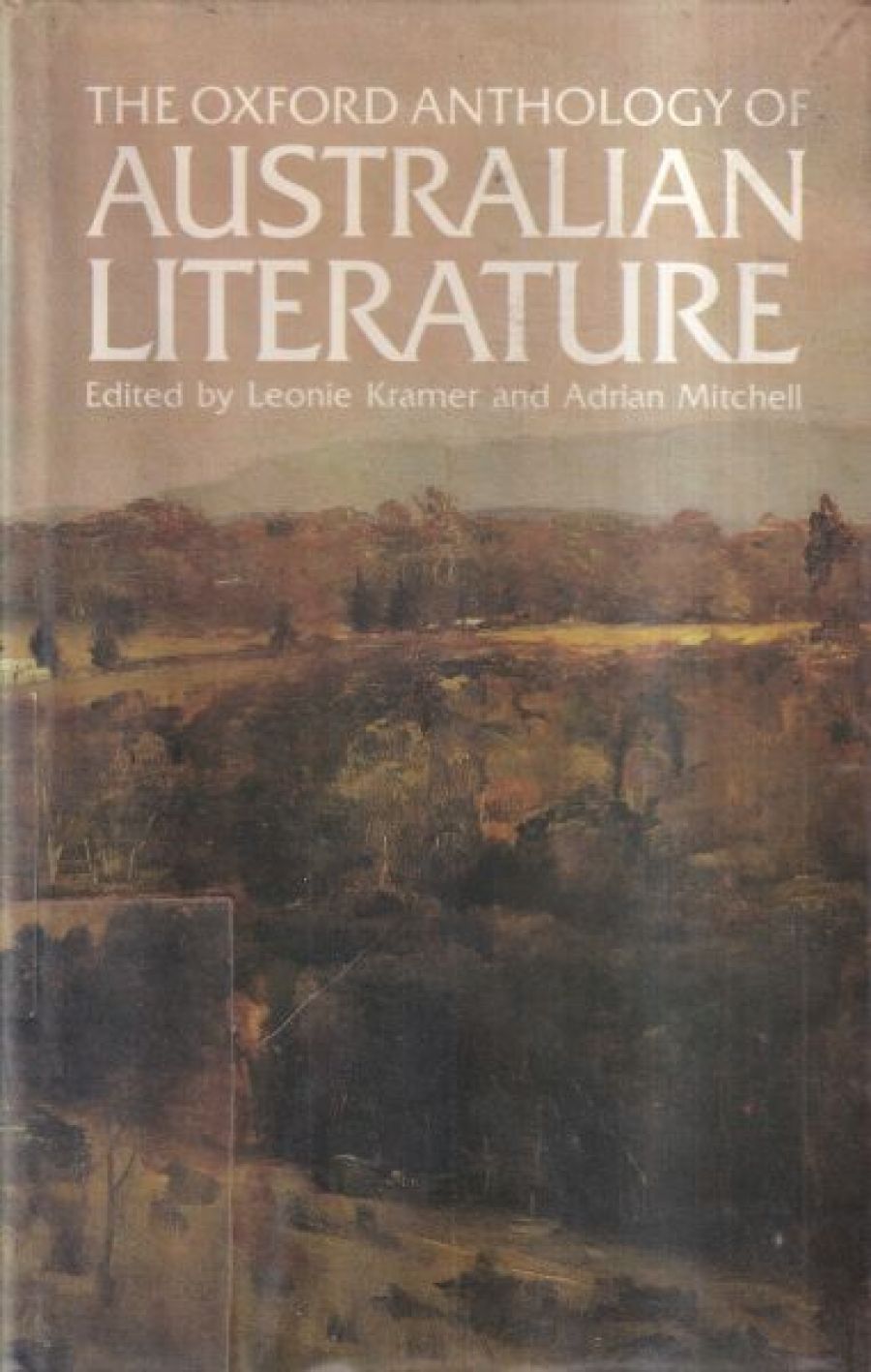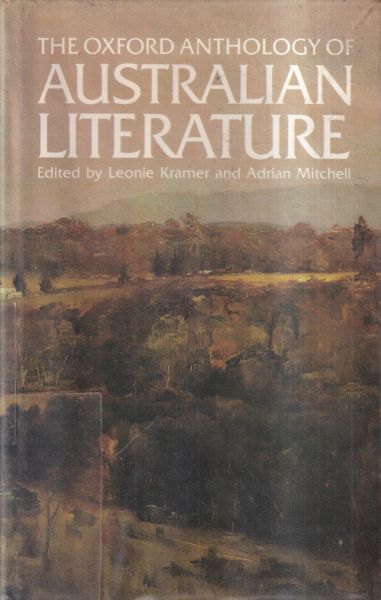
- Free Article: No
- Contents Category: Literary Studies
- Review Article: Yes
- Article Title: An anthology for the thick of nose and dull of ear
- Online Only: No
- Custom Highlight Text:
“ ‘ It was a land of flowers’ said my grandmother,” writes Mary Gilmore [in the passage from Old Days, Old Ways here included],
At sea [in 1836] we noticed the perfume long before we came to [the land] … Australia smelt like the Spice Islands. “We are near Australia,” said the seaman, "Can’t you smell the flowers?” And people raised their heads and breathed in perfumes as it were out 'of heaven, for the land was still invisible….
In the same essay, Dame Mary continues: “The thick-nosed and dull-eared derided her… They called her a land of songless birds and scentless flowers. The world believed them; and for a century we followed in the train of the world, even though on our breath her perfumes hung high.”
- Book 1 Title: The Oxford Anthology of Australian Literature
- Book 1 Biblio: OUP, 589pp., index, $25.00 pb
- Book 1 Cover Small (400 x 600):

- Book 1 Cover (800 x 1200):

Dame Leonie Kramer and Adrian Mitchell begin their more or less comprehensive anthology of Australian writing with just such observations – from Watkin Tench and Barron Field – which, while profoundly literate, seem to us today to be lacking in perceptiveness. While reading Tench’s assessment of the ‘Indians of New South Wales’ … [“a less-enlightened state we shall exclaim can hardly exist”] ... I was vividly reminded of the passage from which Keith Willey took the title of his excellent and most rewarding book When the Sky Fell Down, a quotation from an Aboriginal spiritual leader.
Wishing to compare the two ious poem called ‘The Recantation’ which was undoubtedly written by Pitt, though she disowned it for a long time. It was first published in the are from the same hand: from memory, the person quoted by Willey was attached to Governor Phillip’s household. Had, I felt, these editors, been truly dedicated to the Australianness of our literary heritage, rather than its literariness, they would have made here and there different, and better, choices. I resent the absence of Price Warung, Max Dunn, John Thompson, Dorothy Auchterlonie, Jack Davis and Kath Walker. To include A.B. Paterson and poor Eve Langley, whilst excluding C.J.Dennis and Graham Jankin and all the writers of the Aboriginal tradition [in translation] gathered by Rooney Hall in his recent anthology, reveals an Oxbridge sensibility totally at variance with the ‘temper democratic, bias offensively Australian’ mood of the real spirit of Australian culture as it moves, after the America’s Cup victory, into the 1990s. Their concentration on “sound literary principles” robs this anthology of the vigour and rambunctiousness of – for instance – Geoffrey Dutton’s anthology of Australian poetry 1805-1975 – which is a far truer representation of the essential mood of Australian writing than this present volume. One is very tempted to say that the Oxford book is truly an anthology for the thick-nosed and dull-eared!
Its main virtue – the fact that it embraces essays and literary dissertation as well as passages from novels, short-stories and poems – also becomes its chief weakness. Essays on Aus. Lit; or Aust. Lit. and Life; or more gentle perorations on Australian cultural values (usually culled from the pages of Meanjin, Quadrant or Overland) flow from the pens of Nellie Palmer, P.R. Stephensen, Walter Murdoch, Rex Ingamells, Alistair Kershaw, Patrick White and A.D. Hope, while a short story by Desmond O’Grady and a play by Barrie Oakley deal explicitly with the relationship existing between art and life in Aust. Lit. at various times in our history. This is a delight to the dedicated lover of our national literature, and may be a boon to some students. But it also slows the book down, somehow spoils the fun even gives the game away. For each of the commentators writes from a very partisan position and, however one may love Nettie Palmer or admire Hope, one cannot but notice how small-minded each of them is. Also, in this context, a much wider and truer overview would have been provided. If English officers who stayed here only a few years at the outset of our colonial period can be considered contributors to Australian literature, surely C. Hartley Grattan, an American bibliographer who in 1936 defined the shape and distinguishing features of our literary tradition and who continued to contribute discursive material to Meanjin and A.B.C. radio well into the ’sixties, deserves at least two entries: his original essay and one, say, from the early ’sixties – after his 1959 visit to this country.
The editors have had an enormous job to accomplish and, in many ways, we should be grateful to them. But it is very easy to nit-pick. For instance, why is Kenneth Mackenzie, the poet, represented, while Seaforth Mackenzie, the novelist (same man, different hat) ignored. A passage from his first novel warrants inclusion, certainly as much as the two stories by Glenda Adams.
On the same subject: Peter Carey, a formidable writer of short stories with a prodigious reputation in the northern hemisphere who still lives in Australia, is represented by ‘A Windmill in the West’ from his first book (1974), and whilst this is one of his most ostensibly ‘Australian’ stories, and Swiftian enough, it is not really typical. It reveals virtually nothing of the bravara technique which so distinguishes this most unique of Australian writers.
If Ms Adams can be given two stories, surely Carey can too? ‘The Last Days of a Famous Mime’ and ‘The Chance’, from his second book (1979), are far and away much better stories. After reading ‘The Chance’ (which seemed to me to be a work of incandescent genius) I was so elated I jumped up and ran around the room. whooping for joy: for the first time in my experience I had encountered an Australian artist who had pulled off an effect such as one had hitherto met only in the work of Luis Bunuel, Alfred Hitchcock or Rene Magritte. The only literary equivalent – really – is in Jonathan Swift’s masterpiece, or perhaps Max Frisch, or Musil in ‘The Man Without Qualities’.
Surely an appropriate passage from Manning Clark deserves inclusion? Surely! One could go on discovering nits to be picked. For hours!
Even where I feel the writer chosen deserves to be there, I don’t always find him/her represented by his/her best work. Take Les Murray – a major poet. He is represented by four longish poems and one short one. This is called ‘Sydney and the Bush’ – a very important theme and one very close to the author’s heart. But it is one of his least realised treatments – one which cries out to be re-written. He would have been much better represented by a passage from ‘The Buladelah-Taree Holiday Song Cycle.
Again, not surprisingly, the editors have chosen very carefully among contemporary poets, their choices favouring the bland (and very academic) A.N.LJ.-Poetry Australia axis. Can anybody really contend that Grace Perry deserves inclusion – and Manning Clark doesn’t?!!! Michael Dransfield is represented by two of the finest poems of his I’ve seen. Yet they are totally atypical. Robert Adamson is represented by one – very fine – poem; both his output and his position vis-a-vis the growth of several schools of contemporary poetry demand that he be given at least as many entries as Mackenzie – i.e. three!
One could go on!The importance of this anthology must lie in its focus on the as-yet still poorly-defined ambience between life and cultural identity in a broad (but not really broad enough) selection of Australian writing. That that selection is safe is undeniable. This safeness dulls the vigorous life one feels such a book should have. Also it is poorly laid out and very poorly indexed for use as a text-book at tertiary level – which must be one of its intentions.
Still, the genuine lover of our literature will enjoy being able to flit from commentary to dissertation to creative fiction all in the one book – even if some of the choices [and all of the index] are decidedly for the thick-nosed and dull-eared.


Comments powered by CComment